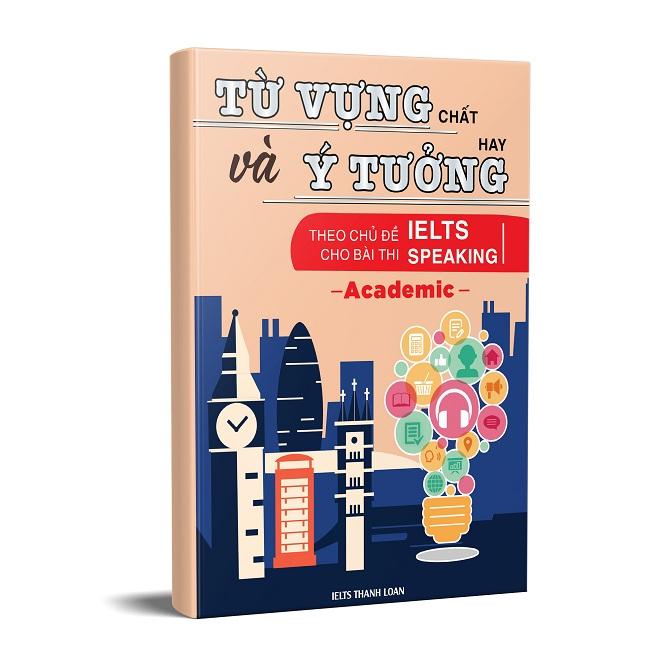Newspapers & Magazines – Báo chí & Tạp chí mặc dù không hẳn là một chủ đề kinh điển trong IELTS Speaking nhưng gần đây cũng có một độ phủ sóng tương đối thường xuyên. Với một chủ đề lớn như vậy, giám khảo có thể đặt hàng loạt câu hỏi khác nhau; vì vậy, việc chuẩn bị câu trả lời cho từng câu hỏi dường như là không thể.
Nhưng bạn có phát hiện rằng một cách chuẩn bị rất hay ho cho Speaking đó là chuẩn bị một số ý tưởng xoay quanh các sub-topics (chủ đề nhỏ) và sau đó mình có thể “thiên biến vạn hoá” khi đối mặt với nhiều câu hỏi khác nhau. Ví dụ với chủ đề này, chúng ta sẽ có những sub-topics như là:
- Habits of reading newspapers and magazines
- Methods of reading newspapers and magazines
- Reasons for reading newspapers and magazines
- Changes in newspapers and magazines
- Press censorship
Trong bài viết này, IELTS Thanh Loan xin gợi ý với bạn những ý tưởng thông dụng nhất về 2 vấn đề, đó là: “changes in newspapers and magazines” và “press censorship“.
Gợi ý sách liên quan
Từ vựng chất và ý tưởng hay theo chủ đề cho bài thi IELTS Speaking
Với các vấn đề còn lại, hãy tham khảo cuốn sách này được biên soạn bởi đội ngũ IELTS Thanh Loan để không bao giờ bí ý, bí từ khi luyện tập và thực hiện bài thi IELTS Speaking.

1. Changes in newspapers and magazines
In former days, newspapers were the most prevalent source of news but over the last few decades, there has been a significant decline in its readership because of the advent of satellite TV channels and the Internet. In fact, these new sources bring news to the consumers much faster and in a more “visually-appealing” manner than newspapers. These days, only low-tech people rely on printed newspapers, I suppose.
Ngày trước, báo chí là nguồn tin tức phổ biến nhất nhưng trong vài thập kỷ qua, lượng độc giả của nó đã sụt giảm đáng kể do sự ra đời của các kênh truyền hình vệ tinh và Internet. Trên thực tế, những nguồn mới này đưa tin tức đến với người dân nhanh hơn và theo cách “hấp dẫn trực quan” hơn báo chí. Ngày nay, tôi cho rằng chỉ có những người công nghệ thấp mới đọc báo in.
It’s safe to say that with the advent of the Internet and modern gadgets, people have been turning to online sources over the past decades. But recently, I’ve seen the reverse as an increasing number of print newspapers and magazines have been sold. As far as I’m concerned, the reason is that many have lost faith in online news which either is fake or exaggerates issues. Meanwhile, it’s not the case for traditional print newspapers and magazines which are censored by the authorities.
Có thể nói rằng với sự ra đời của Internet và các tiện ích hiện đại, mọi người đã chuyển sang các nguồn trực tuyến trong những thập kỷ qua. Nhưng gần đây, tôi nhận thấy điều ngược lại là ngày càng có nhiều báo in và tạp chí được bán ra. Theo như tôi được biết, lý do là nhiều người đã mất niềm tin vào tin tức trực tuyến, những tin tức giả mạo hoặc phóng đại các vấn đề. Trong khi đó, các tờ báo và tạp chí in truyền thống được các cơ quan chức năng kiểm duyệt lại không như vậy.
I think that newspapers and magazines are likely to disappear in the future in their current forms. The internet has been gaining so much popularity and Internet users are increasingly turning online to receive all kinds of news and information for free. Besides, some argue that newspapers and magazines will fall into disuse because they are not eco-friendly. The production takes tons of wood materials and electricity and the cost of transport is not low at all.
Tôi nghĩ rằng các tờ báo và tạp chí có khả năng biến mất trong tương lai dưới dạng hiện tại của chúng. Internet đã trở nên phổ biến và người dùng Internet ngày càng chuyển sang trực tuyến để tiếp cận tất cả các loại tin tức và thông tin miễn phí. Bên cạnh đó, một số người cho rằng báo và tạp chí sẽ rơi vào tình trạng không được sử dụng vì chúng không thân thiện với môi trường. Việc sản xuất tốn hàng tấn nguyên liệu gỗ và điện năng và chi phí vận chuyển không hề thấp.
I believe that print newspapers and magazines will survive forever. The simple reason is that there is nothing quite like holding a newspaper in our hands with the comforting scent of the pages. There is still a strong contingent of people who prefer printed versions of news. Besides, there is a universal perception that physical pieces are authentic as each one of them has undergone proofreading and review.
Tôi tin rằng báo in và tạp chí sẽ tồn tại mãi mãi. Lý do đơn giản là không có gì giống với việc chúng ta cầm một tờ báo trong tay với mùi dễ chịu của những trang giấy. Vẫn có rất nhiều người thích phiên bản in của tin tức. Bên cạnh đó, người ta thường nghĩ rằng các tờ báo in có độ chân thực cao hơn vì chúng trải qua quá trình hiệu đính và xem xét.
Giải thích từ vựng:
- prevalent /ˈprevələnt/ (adj): thịnh hành
ENG: that exists or is very common at a particular time or in a particular place - visually appealing /ˈvɪʒuəli əˈpiːlɪŋ/ (adjective phrase): đẹp mắt
ENG: attractive in a way that is connected with seeing or sight - low-tech /ˌləʊ ˈtek/ (adj): mù công nghệ
ENG: not involving the most modern technology or methods - reverse /rɪˈvɜːs/ (noun): điều ngược lại
ENG: the opposite of what has just been mentioned - lose faith in somebody/ something /feɪθ/ (verb phrase): mất niềm tin
ENG: to lose trust in somebody’s ability, knowledge, promise, etc. - exaggerate something /ɪɡˈzædʒəreɪt/ (verb): phóng đại
ENG: to make something seem larger, better, worse or more important than it really is - censor something /ˈsensə(r)/ (verb): kiểm duyệt
ENG: to remove the parts of a book, film, etc. that are considered to be offensive or a political threat - fall into disuse /dɪsˈjuːs/ (verb phrase): không còn được sử dụng
ENG: to be in a situation in which something is no longer being used - eco-friendly /ˌiːkəʊ ˈfrendli/ (adj): thân thiện với môi trường
ENG: not harmful to the environment - a contingent of somebody /kənˈtɪndʒənt/ (noun phrase): nhiều, nhóm, đội ngũ
ENG: a group of people at a meeting or an event who have something in common, especially the place they come from, that is not shared by other people at the event - proofread something /ˈpruːfriːd/ (verb): hiệu đính
ENG: to read and correct a piece of written or printed work
Câu hỏi luyện tập: How have newspapers changed over the last few decades in your country?
2. Press censorship
I believe the government is already censoring the media, but I think this is very bad. I believe we are only given parts and pieces of stories from around the world and very often our sources are biased. I do not believe the media should be censored and I believe they should be able to carry out fact-finding missions and help people blow the whistle on something wrong.
Tôi tin rằng chính phủ đã kiểm duyệt các phương tiện truyền thông rồi, nhưng tôi nghĩ điều này rất tệ. Tôi tin rằng chúng ta chỉ được cung cấp một phần các mẩu chuyện từ khắp nơi trên thế giới và các nguồn tin tức thường có tính thiên vị. Tôi tin rằng các phương tiện truyền thông không nên được kiểm duyệt và tôi tin rằng chúng nên được thực hiện các nhiệm vụ tìm hiểu thực tế và giúp mọi người được biết về những điều sai trái.
It’s important to bear in mind that media censorship has its advantages when used with the best of intentions. It stops fake news. If more content was closely monitored, it could cut down on the mass amounts of fraudulent information including false advertising.
Điều quan trọng cần lưu ý là kiểm duyệt phương tiện truyền thông có những lợi thế khi được sử dụng với mục đích tốt nhất. Nó ngăn chặn tin tức giả mạo. Nếu nhiều nội dung hơn được giám sát chặt chẽ, nó có thể cắt giảm lượng lớn thông tin lừa đảo bao gồm cả quảng cáo sai sự thật.
Giải thích từ vựng:
- biased /ˈbaɪəst/ (adj): thiên vị, chủ quan
ENG: tending to show favour towards or against one group of people or one opinion for personal reasons; making unfair judgements - blow the whistle on something /ˈwɪsl/ (idiom): tố giác
ENG: to bring something to the attention of other people in order to stop something bad from happening - bear in mind somebody/ something/ that … (idiom): ghi nhớ, nhớ kỹ
ENG: to remember somebody/ something; to remember or consider that… - cut down on something (phrasal verb): cắt giảm
ENG: to reduce the size, amount or number of something - fraudulent /ˈfrɔːdʒələnt/ (adj): lừa gạt, lừa đảo
ENG: intended to cheat somebody, usually in order to make money illegally
Câu hỏi luyện tập: Do you think the government has the right to censor the press?
Bài viết liên quan:
- Từ vựng và ý tưởng IELTS Speaking theo chủ đề – Reading
- Từ vựng và ý tưởng IELTS Speaking theo chủ đề – Colours
- Từ vựng và ý tưởng IELTS Speaking theo chủ đề – Famous People
IELTS Thanh Loan – Trung tâm luyện thi IELTS cung cấp các khóa học IELTS Online, sách IELTS:
- ĐT: 0974 824 724
- Email: [email protected]
- Địa chỉ: S103 Vinhomes Smart City, Tây Mỗ, Nam Từ Liêm, Hà Nội













